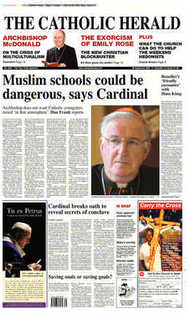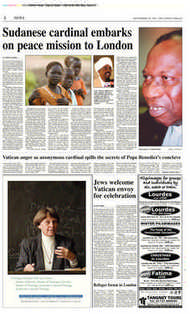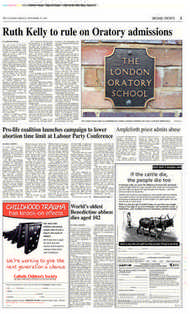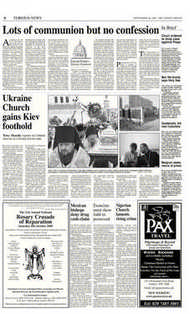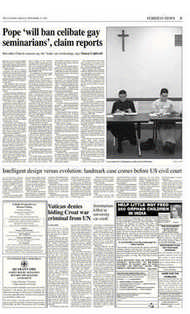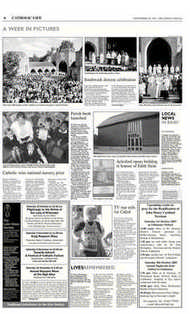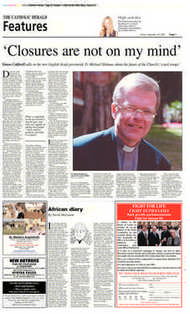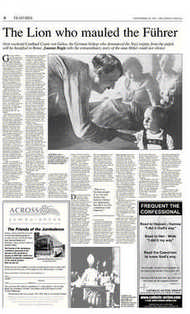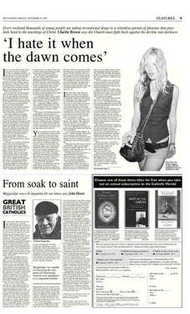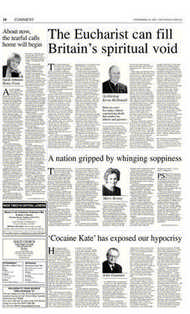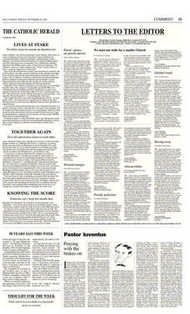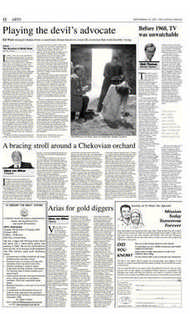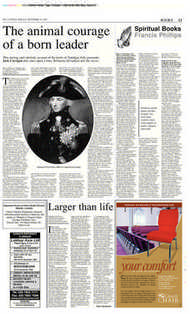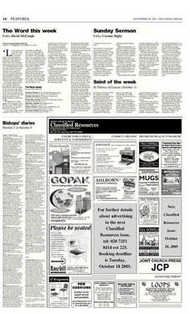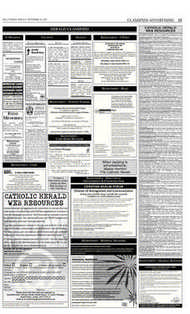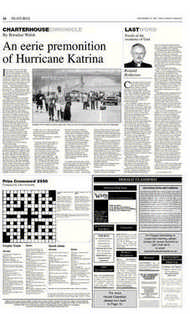Page 8, 30th September 2005
Page 8

Report an error
Noticed an error on this page?If you've noticed an error in this article please click here to report it.
Tags
Share
Related articles
Pope To Beatify ‘lion Of Münster’
An Anvil Under The Nazi Hammer
Cardinal Von Galen Of Munster
Neutral Journalist, Lately In Germany, Tells " C. H." Of...
Lion Of Münster To Be Beatified
New Evidence In Favour Of Pope Pius
The Lion who mauled the Führer
Next weekend Cardinal Count von Galen, the German bishop who denounced the Nazi regime from the pulpit,
will be beatified in Rome. Joanna Bogle tells the extraordinary story of the man Hitler could not silence German Catholics, who this year have seen the election of a German Pope, and the jubilant celebration of a spectacular World Youth Day with more than a million young people from across the world gathering in Cologne, now have another cause for enthusiasm. Large numbers of them will be in Rome next weekend to see a famous German bishop honoured: Cardinal Count von Galen, the “Lion of Münster”, is being beatified, the penultimate step on the road to his being proclaimed a saint.
Bishop Clemens von Galen was the heroic voice of Germany’s Christian conscience during Second World War. In defiance of the Nazis – and in daily expectation of being taken away to prison or a concentration camp – he hurled criticism at the country’s euthanasia programme, and demanded that the killing of the disabled and the sick be stopped.
Born into an aristocratic family at the end of the 19th century, Count von Galen had worked as a young priest in Berlin before returning to his native Rhineland where he was appointed Bishop of Münster, presiding over a Catholic community with deep roots where families cherished their unbroken religious tradition and its associated customs and folklore.
As bishop, von Galen was greeted with festive garlands and local hymns when he went to country parishes for confirmations. The youth movements, women’s groups and parish organisations associated with the Church represented a challenge when the Nazis, gaining power in Germany, sought to nationalise all community organisations and marginalise the Church.
Copies of von Galen’s sermons, smuggled out of the country, were reprinted in Britain and dropped by the Royal Air Force so that they circulated all over Germany. In dramatic language, Bishop von Galen used the imagery of Christ weeping over Jerusalem to describe his sorrow at the state of Germany.
Although von Galen has historically been seen simply as an anti-Nazi figure, today his opposition to euthanasia, and also to the Nazis’ racial policies, rabid nationalism and anti-Church stance, has a new significance. In the years immediately following the War, euthanasia was regarded with abhorrence. But today it is legal in some European countries, is openly discussed as a policy option in others, and has gained an acceptability once regarded as unthinkable. Similarly, attacks on the Church for being outdated, irrelevant, opposed to progress and promoting hidebound beliefs at variance with the needs of a forwardlooking community, also have an uncomfortably familiar ring. Bishop von Galen’s robust defence of the right and duty of Christians to stand up for traditional values seems right up to date.
It is interesting that the Nazi propaganda machine in Germany seized on instances of priests and members of religious orders being involved in paedophile activity to promote the idea that this was a widespread problem involving vast numbers of clergy. There were also attempts to replace traditional Christian celebrations with secular ones, to emphasise young people’s independence from their parents and from family bonds, to direct them towards youth leaders who would instruct them in very different values.
Bishop von Galen, in a 1941 sermon, denounced euthanasia policies which gave “legal sanction to the forcible killing of invalids, the disabled, the incurable and the incapacitated”. As Bishop of Münster, and a member of a family which for centuries had played a leading role in public life, he spoke with authority and when he gave details of what was taking place in local hospitals it caused uproar.
“I have discovered,” he said on one occasion, “that the practice here in Westphalia is to compile lists of such patients who are to be removed elsewhere as ‘unproductive citizens’ and after a period of time put to death. This very week, the first group of these patients has been sent from the clinic of Marienthal, near Münster.” He pointed out that murder was still, officially, illegal in Germany. “It is in order to protect the murderers of these poor invalids – members of our own families – against legal punishment, that the patients who are to be killed are transferred from their domicile to some distant institution. Some sort of disease is then given as the cause of death, but as cremation immediately follows, it is impossible for either their families or the regular police to ascertain whether death was from natural causes.
“Once we admit the right to kill unproductive persons – then none of us can be sure of our lives. We shall be at the mercy of any committee that can put a man on a list of unproductives ... If this dreadful doctrine is permitted and practised it is impossible to conjure up the degra dation to which it will lead.
“Woe to us German people if we not only license this heinous offence but allow it to be committed with impunity! ‘Thou shalt not kill.’ God engraved this commandment on the souls of men long before any penal code laid down punishment for murder, long before any courts prosecuted and avenged homicide. Because of his love for us God has engraved these commandments on our hearts and has made them manifest to us. They are the unchangeable and fundamental truths of our community life grounded on reason, well pleasing to God.” Describing the fate that awaited a country which allowed the murder of its disabled citizens and the destruction of its moral values, Bishop von Galen used dramatic biblical language, quoting Christ’s prophesy that Jerusalem would be destroyed “not leaving one stone upon another”. When the Allied bombing raids reduced Münster and other German cities to rubble, people remembered his words and regarded him as a prophet.
In addition to opposing euthanasia, Bishop von Galen denounced the Nazis for introducing pagan ideas of worshipping nation and race, for promoting adultery and sexual licence, and for mocking God and the Church. He called on faithful Catholics to oppose all who “revile our faith, who hate God’s commandments, who associate with those who alienate young men from their religion, who rob and drive out monks and nuns, who condemn our innocent brothers and sisters”. He said that the new ideas in Germany meant that people were breaking the commandment to honour their parents and also the commandment about the Sabbath – Sunday as a day for church was being deliberately undermined by the promotion of other activi ties on that day.
Of tall and commanding appearance, the bishop was known for his austere life – especially during the war when food was short and he refused any small luxuries that could instead be given to children or to the sick – and for his dedication to prayer and his reverence for the Eucharist. He especially liked traditional devotions and oldfashioned hymns which helped people to associate their faith with family and community memories. His opposition to the Nazis centred not only on their contempt for the sanctity of life and their reviling of nonGerman races but also on their open dislike of old traditions, and the morals and family life of Catholics.
Today one of Bishop von Galen’s nieces, Countess Johanna von Westphalen, runs a pro-life lobby group “Christian Democrats for Life”, which plays a major role in campaigning against euthanasia and abortion.
The church in Münster where the Bishop preached and where he is buried has become a place of pilgrimage, and there are always flowers and votive offerings on his grave.
Officially silenced by the authorities, Bishop von Galen was due for arrest but – as revealed in papers captured by the Allies after the end of the war – there was concern about an uprising in Westphalia if he were taken away.
With war on two fronts – against the western Allies and the Soviet Union – the Nazis could not hold down unrest in a central part of Germany. But while the bishop remained in Münster (he was almost killed when the cathedral and his adjoining residence were destroyed) the Nazis organised a round-up of several of his priests and a number were taken away to concentration camps, never to return. Trying to discover their whereabouts, and to protect other clergy and church workers from a similar fate, occupied much of the bishop’s time, in addition to relief work for people made homeless by raids.
He died shortly after the end of the war, just one month after having been made a cardinal in recognition of his faithfulness and the stance he had taken on the moral issues confronting Germans.
Pope Benedict, who was a teenager during the Second World War, has spoken about the way in which the Church, because of bishops like von Galen who had opposed the Nazis, was able to rebuild moral values in Germany after the war.
In The Ratzinger Report, he pointed out that while Vatican II emphasised the role of bishops and their authority, in practice this “risks being smothered by the insertion of bishops into episcopal conferences that are ever more organised, often with bureaucratic structures”.
He expressed concern that bishops would forget their grave personal responsibilities, especially on difficult questions, and lapse into bland anonymity. “The really powerful documents against National Socialism were those that came from individual courageous bishops,” he said.
“The documents of the conference were, on the contrary, often rather wan and too weak with respect to what the tragedy really demanded.”
blog comments powered by Disqus


